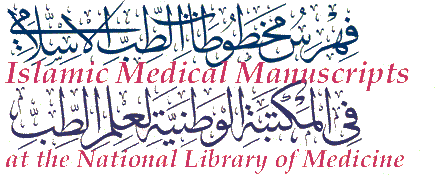Catalogue: Medical Monographs
 A Note on Diagnosis and Prognosis
A Note on Diagnosis and Prognosis
Diagnosis and prognosis -- the ability to state what was wrong with the patient and to predict the course of the ailment -- were of primary importance to medieval physicians. In particular, they were concerned to know if the patient might die, so as to be able to predict the event and avoid accusation of having caused the death through medicaments or procedures employed. Most diagnosis and prognosis of internal conditions displaying no overt symptoms were based upon the examination of urine or feeling the pulse of the patient, though other methods were employed as well, including astrology and other divinatory techniques.
The topics of diagnosis and prognosis formed a part of every medieval medical encyclopaedia. NLM has only a few small treatises devoted exclusively to the subject. Four of these are anonymous tracts that will be catalogued below. There is also in the collection a poem on pulse and urine that is attributed to Ibn Sīnā (Avicenna) in (MS A 34, item 2), catalogued amongst the medical poetry. There is also a section on the palpitation of the arteries in a treatise falsely attributed to Galen titled Kitāb Taqāsīm al-insānīyah fī al-ṣūrah al-basharīyah (The Classification of People in Terms of the Bodily Forms) in (MS A 74), which also includes a short discourse on the examination of urine, with the title Qala fī sifat al-bawl (He said concerning the property of urine).










